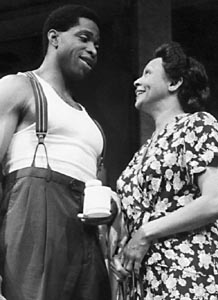![[Metroactive Stage]](/stage/gifs/stage468.gif)
[ Stage Index | San Jose | Metroactive Central | Archives ]
 Settling In: Aldo Billingslea and Judyann Elder share a troubled apartment in 'The Old Settler.'
Settling In: Aldo Billingslea and Judyann Elder share a troubled apartment in 'The Old Settler.'
Photograph by David Allen
Unmarrying Kind Two sisters bicker for love in TheatreWorks' 'The Old Settler' By Heather Zimmerman BLOOD IS THICKER than water--and nobody can draw blood deeper than relatives can when they get into it. Such a combative but ultimately loving sibling relationship is the focus of John Henry Redwood's The Old Settler, which has its Bay Area premiere at TheatreWorks. Judging from the constant bickering between African American sisters Elizabeth (Judyann Elder) and Quilly (Vickilyn Reynolds), it would seem that the two fiftysomething women had shared their apartment in 1940s Harlem for years. But the never-married Elizabeth (an "old settler" in Harlem parlance) has only recently taken in Quilly, newly separated from her husband. The subject of Quilly's marriage fuels a long-standing feud between the sisters that remains largely unspoken. Into this tense household comes more conflict: a young boarder named Husband (Aldo Billingslea). Husband has followed a would-be girlfriend, Lou Bessie (Comika Griffin), to New York from their small South Carolina hometown. This ingenuous country boy is completely adrift in New York and quickly inspires a lot more than friendly affection in Elizabeth. Husband returns Elizabeth's feelings (in fact, he sort of instigates them), though to what extent is left somewhat unclear, perhaps deliberately to keep the focus on the sisters' relationship. Quilly's reaction to the romance is inevitably suspicion--and very vocal objections. It's not hard to see where this May-December romance is headed, and Redwood never pretends otherwise. Storywise, there are few surprises in The Old Settler; indeed, even the reason for the sisters' bitter feelings over Quilly's marriage is easy to guess, but the emotion behind the sisters' painful history and Redwood's skillful and witty dialogue make this bittersweet play quite enjoyable. Director Edris Cooper-Anifowoshe has captured all the emotional nuances of this character-driven piece, so that a scene as simple as Elizabeth packing a picnic basket conveys hope, joy, love, desperation and denial all at once. The performances are superb. Elder and Reynolds play exceptionally well off each other--there are equal parts anger and love in their relationship, made even more complex with each sister's growing fear of loneliness. Elder imbues the wise, even-keeled Elizabeth with cautious hope, but we can see how well she remembers disappointment. As Quilly, Reynolds displays a fragility that balances her character's broad comedy. Billingslea is completely winning as the guileless Husband, a country boy--but not a bumpkin--too good-hearted to want to understand the machinations of the mean streets of the city, or of the newly citified Lou Bessie. Griffin adeptly wrangles with the vampish sexuality and boundless confidence of Lou Bessie. Redwood touches on some larger social issues, particularly racism, from a deeply personal perspective that provides further insight into the sisters' relationship. While Elizabeth makes plans to go live in South Carolina with Husband, Quilly describes how a friend and her children were forced off a train so that white people could have their seats. Her sadness at such an injustice is profound enough, but Redwood shows us that facing similar cruelties without the support of her sister would be the only way to make it worse. Redwood clearly has affection for all of his characters, even the duplicitous Lou Bessie, and it pays off in this solidly crafted microcosm of life in 1940s Harlem. Undesirable as the lot of the "old settler" might have been considered--and still is, to some--Redwood shows that the deepest bonds aren't necessarily always reserved for the marrying kind.
The Old Settler plays Tuesday at 7:30pm, Wednesday-Saturday at 8pm plus July 29 and Aug. 5 at 2pm, Sunday at 2 or 7pm (July 30 at 2 and 7pm), through Aug. 20 at the Lucie Stern Theatre, 1305 Middlefield Rd., Palo Alto. Tickets are $20-$38. (650.903.6000) [ San Jose | Metroactive Central | Archives ]
|
From the July 27-August 2, 2000 issue of Metro, Silicon Valley's Weekly Newspaper.
Copyright © 2000 Metro Publishing Inc. Metroactive is affiliated with the Boulevards Network.
For more information about the San Jose/Silicon Valley area, visit sanjose.com.